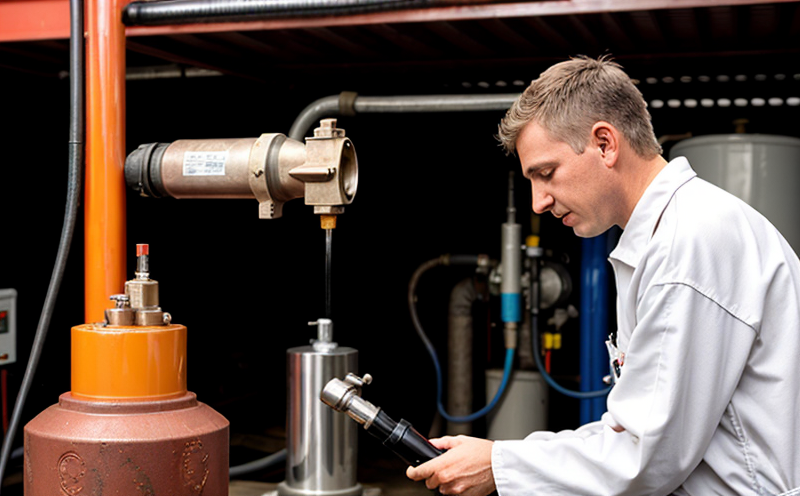ASTM D5452 Particulate Contamination Testing of Aviation Fuel
The ASTM D5452 standard test method is a critical procedure used to assess the particulate contamination within aviation fuel. This testing is essential for ensuring that fuels meet the stringent quality and performance requirements necessary for safe and reliable aircraft operations. In this context, particulate contamination refers to solid particles present in the fuel which can cause significant problems when ingested by the engine.
The presence of even minute amounts of particulates can lead to reduced fuel filter life, increased wear on engine components, and even complete system failure under extreme conditions. This makes ASTM D5452 testing a crucial step in quality control processes for both aviation fuel suppliers and manufacturers seeking to ensure compliance with regulatory standards.
The methodology involves the use of filtration techniques to separate particulates from the fuel sample. The collected particulates are then analyzed using various analytical instruments such as microscopes, scanning electron microscopy (SEM), and X-ray fluorescence (XRF) spectrometry, among others. These tools help identify the type, size distribution, and elemental composition of the contaminants.
Understanding the particulate contamination level is not merely about identifying the presence or absence of particles; it’s also about comprehending their characteristics which can influence fuel performance. For instance, larger particles may indicate a higher risk of blockage in fuel system filters, while smaller particles could suggest wear and tear issues within the engine.
ASTM D5452 testing goes beyond mere quantification of particulate matter; it provides insights into potential sources of contamination. By analyzing the elemental composition of the contaminants, analysts can determine whether they originate from manufacturing processes, storage facilities, handling procedures, or even natural occurring elements present in the fuel source.
This detailed understanding allows for targeted corrective actions aimed at improving fuel quality and reducing risks associated with particulate contamination. It also supports ongoing improvements in production methods and supply chain management practices to ensure consistent fuel purity levels across different batches and deliveries.
Scope and Methodology
The ASTM D5452 test aims at quantifying the total particulate matter in aviation fuel samples by filtration. This section outlines the scope, methodology, and supporting context for this specific testing.
| Scope | Description |
|---|---|
| Total Particulate Matter | The total amount of solid particles present in the aviation fuel sample. |
| Sample Preparation | Involves filtering a known volume of fuel through a specified filter material. |
| Methodology | Description |
|---|---|
| Filtration | The fuel sample is passed through a membrane filter with a specified pore size. |
| Analysis | The collected particulates are analyzed using microscopy techniques to determine their quantity and characteristics. |
The scope of ASTM D5452 focuses on the total particulate content rather than specific types or sources. The methodology involves careful sample preparation, filtration through a defined pore size filter, followed by detailed analysis using advanced microscopy techniques.
Eurolab Advantages
EuroLab offers unparalleled expertise and cutting-edge facilities for ASTM D5452 particulate contamination testing of aviation fuel. Our state-of-the-art laboratories are equipped with the latest technology, ensuring accurate results that meet or exceed industry standards.
- Accurate Results: Leveraging advanced analytical instruments like SEM and XRF spectrometry for precise particulate analysis.
- Comprehensive Reporting: Providing detailed reports on particle size distribution, type, and elemental composition to guide corrective actions.
- Experienced Staff: Our team of highly qualified professionals brings extensive experience in fuel testing and quality assurance.
- Strict Compliance: Ensuring that all tests adhere strictly to ASTM D5452 guidelines for reliability and accuracy.
EuroLab’s commitment to excellence extends beyond just conducting tests; we also offer consulting services to help clients understand their particulate contamination issues better. Our comprehensive approach ensures not only compliance but also continuous improvement in fuel quality, thereby enhancing overall operational safety and efficiency.
Customer Impact and Satisfaction
- Enhanced Safety: Ensures that aviation fuels meet the highest standards of safety, reducing risks associated with particulate contamination.
- Improved Efficiency: By maintaining consistent fuel quality, there is reduced downtime due to engine failures or malfunctions.
- Cost Savings: Early detection and mitigation of contamination issues can prevent costly repairs and replacements of components.
- Regulatory Compliance: Ensures that all tests comply with international standards like ASTM D5452, thereby avoiding potential legal challenges.
Customer satisfaction is a key priority at EuroLab. Our clients appreciate the reliability and accuracy of our test results, which form the basis for informed decision-making processes within their organizations. Regular feedback from satisfied customers reinforces our dedication to providing top-tier testing services tailored specifically towards meeting their unique needs.





